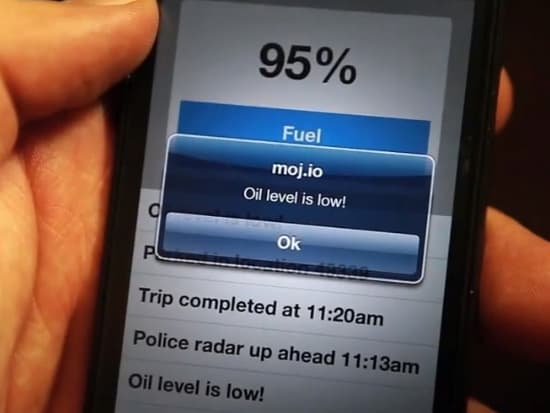
Mojio’s Jay Giraud: ““The car really is the ultimate wearable device.“Yet it’s the last computer to still be disconnected from the Internet.”Last Wednesday, 10 companies in search of venture capital stood in front of a small audience at the inaugural Google for Entrepreneurs demo day, trying to impress three judges into awarding them the trophy for top pitch.
The competing pitches were drawn from Google’s Tech Hub network, composed of seven cities scattered around the United States, except for the lone Canadian spot occupied by Waterloo’s Communitech Hub, home to such high-flier success stories as Thalmic Labs and Vidyard.
Communitech’s entry into the pitch competition was Mojio, makers of a cellular-network enabled, open API device for connecting cars to the Internet.
And so, with 10 pitch teams taking turns trying to compress their company’s narrative into a five-minute presentation, Mojio’s CEO Jay Giraud and VP of business development Richard Woodruff took to the stage, after listening to eight frankly amazing “all-killer, no-filler” pitches from American companies.
One of the three judges, AOL co-founder Steve Case, spoke eloquently about what he calls “the rise of the rest”, a phenomenon that he believes stands a chance at reinvigorating regions around the United States, instead of forcing everyone to come to Silicon Valley to launch their next great idea and concentrating all of the power and infrastructure in a single area.
Adding a sense of perspective often lacking in the fizzy triumphalism of start-up culture, Case reminded the audience how quickly success can become past glory. “Detroit, as all of you know, 60 years ago was the epicentre of innovation when the car industry, when personal transportation was the technology of the day. Detroit was on fire. It was growing like crazy, the whole supply chain and libraries were being built and schools were being built, the non-profits were started, because of the strength of Detroit based on the strength of that technology of the time. Now Detroit is struggling. It actually, 60 years later, has lost 60% of its population and recently declared bankruptcy, because it kind of lost its entrepreneurial mojo. So we have to recognize, these regions can rise, these regions can fall.”
It was picked up on later by Damian Rocchi, speaking for Detroit’s Google Hub, Grand Circus. “We all know about the bankruptcy,” he said wearily. “What you might not know about, that you should know, is what I think is a pretty spectacular transformation that’s happening in the city. And that transformation is being led by tech.”
Watching the 10 pitches in sequence, pared down to five-minute presentations followed by two questions from the judges, the companies seemed very evenly matched. To even get to this stage, each participant is selected through an already rigorous process competing against start-ups from their home area.
Matthew Davidson, representing Communitech, spelled out that although Waterloo’s actual population is relatively small, it has a mighty infrastructure bolstered by the University of Waterloo and its formidable math and science departments, not to mention an in-house tech incubator watched over by such heavy-hitters as Mike Lazaridis.
Mojio’s Jay Giraud hit the ground running in his presentation, outlining the rationale for their device with a clever tagline that simultaneously struck a note that evoked the current mania around wearable technology. “The car really is the ultimate wearable device,” he said, “Yet it’s the last computer to still be disconnected from the Internet.”
Mojio’s technology is a 3G cellular device with an open API, which means that anyone can write an app for any car on the road today. It’s an onboard diagnostic device that connects to a car’s computer, plugging in to the OBD port, which all cars manufactured after 1995 have.
The company has plans to partner with T-Mobile and Telus within the next two months, and will then be targeting telecoms in Europe and Latin America.
At the end of the day, the trophy was was taken by Windsor Circle from Durham, North Carolina. But then, in an apparently unplanned moment, Steve Case announced that he would personally give $100,000 each to all participating 10 teams, earning the surprise and applause of everyone in the room.
____________________________________________________________________________________________________________
Leave a Reply
You must be logged in to post a comment.




 Share
Share Tweet
Tweet Share
Share




Comment